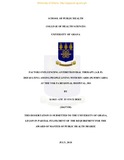UGSpace Repository
Factors Influencing Antiretroviral Therapy (A.R.T) Defaulting Among People Living With Hiv/Aids (Plwhiv/Aids) At the Volta Regional Hospital, Ho
- UGSpace Home
- →
- Theses
- →
- Masters
- →
- College of Health Sciences
- →
- School of Public Health
- →
- View Item
JavaScript is disabled for your browser. Some features of this site may not work without it.
| dc.contributor.author | Koku-Anu , J.D. | |
| dc.date.accessioned | 2018-12-11T13:11:35Z | |
| dc.date.available | 2018-12-11T13:11:35Z | |
| dc.date.issued | 2018-07 | |
| dc.identifier.uri | http://ugspace.ug.edu.gh/handle/123456789/26324 | |
| dc.description.abstract | Background: The introduction of antiretroviral therapy by the global scientific community has been a breakthrough in the fight against Human Immuno-Deficiency Virus and Acquired Immune Deficiency Syndrome. In Ghana, about 195 facilities were said to be rendering Anti-retroviral therapy as at 2015 ending with 119,600 people being put on Antiretroviral medicines. However, defaulting of antiretroviral therapy by patients on medication, remains a threat to this otherwise successful health intervention. Objective: This study aimed at assessing the factors that influence Anti-retroviral therapy defaulting by People Living with Human Immuno-Deficiency Virus and Acquired Immune Deficiency Syndrome at the Volta Regional Hospital. Methods: The study applied a cross sectional design using a structured questionnaire (quantitative method) to collect data from 190 simple random sampled participants attending the antiretroviral therapy centre for analysis. Descriptive analysis was run to obtain proportions and frequencies for all categorical variables observed in this study. The outcome variable (Anti-retroviral therapy defaulting) was categorized into a binary variable (yes or no). Chi-square and multiple logistic regression analysis were used to establish relationship between Anti-retroviral therapy defaulting and the independent variables. Multiple logistic regression analysis was run to adjust for confounders significance level was set at p<0.05. Results: The ART defaulter rate was 56.8%. Generally, some health facility, one community related factor, economic factors and patient related factors were found to have some influence on ART defaulting (p<0.05). Various reasons were attributed for defaulting. For instance, 18.4% said they were too busy, while 4.7% said they felt better and did not want to go for treatment again. These were all found to have significant association with Anti-retroviral therapy defaulting (p<0.05). Culture, a community related factor was found to have a strong influence on defaulting (p<0.05). about 54.1% of respondents attributed defaulting to the long waiting hours they spend at the service site: OR = 0.02; 95 % CI = [0.001, 0.49]; p<0.05) and food insecurity (OR = 0.97; 95 % CI = [0.46, 2.06]; p<0.05), also had a significant association with ART defaulting. Education also had some significant association with Anti-retroviral therapy defaulting (p<0.05). Conclusion/Recommendation: Various reasons contribute to ART defaulting. These include spending long hours at the clinic, financial constraints, too busy for hospital appointment and cultural beliefs. It is therefore, recommended that serve providers send reminders to clients to remind them when their appointment dates are approaching. Facility should institute more ART clinic days to avert the crowding and waiting for long hours at the ART clinic sites. More adherence counselling should be done throughout the treatment period. | en_US |
| dc.language.iso | en | en_US |
| dc.subject | Antiretroviral | en_US |
| dc.subject | Therapy | en_US |
| dc.subject | Hiv/Aids | en_US |
| dc.subject | Defaulting | en_US |
| dc.subject | Counselling | en_US |
| dc.subject | Syndrome | en_US |
| dc.subject | Deficiency | en_US |
| dc.subject | Human Immuno | en_US |
| dc.title | Factors Influencing Antiretroviral Therapy (A.R.T) Defaulting Among People Living With Hiv/Aids (Plwhiv/Aids) At the Volta Regional Hospital, Ho | en_US |
| dc.type | Thesis | en_US |
Files in this item
This item appears in the following Collection(s)
-
School of Public Health [1491]
